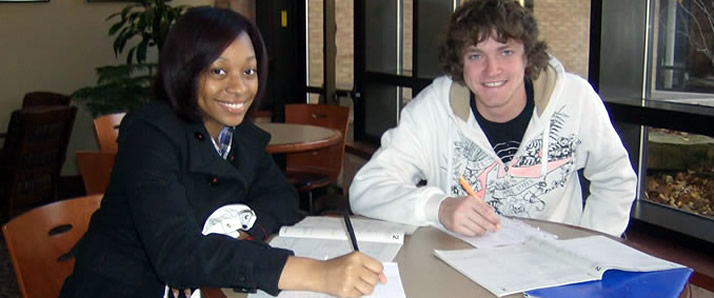In an attempt to round out existing dorm leadership positions, residence life is instituting a new position — Academic Help Ambassadors (AHAs) — to help first-year students make connections to Student Academic Services (SAS). Academic Counselor Kyle Heys created the position, currently in its trial period, after he noticed a gap in dorm leadership.
Although residence life, Heys said, “has this fantastic vision of having leadership positions that connect to many areas in the kingdom of God … one area left out was academics,” he explained.
Sophomore AHAs help students connect to available academic resources, initiate focused study times and help overwhelmed first-years with registration.
Kurt Delos Trino, an AHA in Kalsbeek-Huizenga-van Reken, who is used to explaining his position to confused students, laughed, “I basically just represent for academic services and try to help the students in the dorms get enough resources about SAS.” According to him, AHAs “focus on making sure everyone, mainly freshmen, know about the resources that they have,” like the Rhetoric Center and tutoring.
According to Heys, “one of the reasons we decided to form the position was to provide practical skills to students in academics.”
But the volunteer dorm leadership position isn’t necessarily here to stay.
“We’re running it as a pilot this year; we only hired people in four halls,” said Heys. “We’re trying this out … we want to see if it’s something students find helpful … and make sure it’s a valuable use of [the volunteers’] time.”
One challenge the AHAs have faced is raising awareness about the position. “I think a lot of people still don’t know who we are,” said Bormann. “It’s hard getting the word out. We’re trying to figure out the best way to get the word out so that they know what’s happening without sending out a bajillion emails.”
Delos Trino agreed. “It’s a new position, so not that many people know about it.”
“We think of this as a work in progress,” said Heys. “We’re open to feedback.” Though he thinks the position is “off to a good start,” he explained that “we haven’t yet done assessment work,” since it’s still a pilot program.
If AHAs can continue to provide helpful assistance to students, the position could become permanent.
“We’ve had great successes with focused study groups, interaction with students one-on-one, help with registration … and other areas,” Heys said, adding, “The people we’ve hired are fantastic … they’re great at thinking about creative ideas and saying what works and what doesn’t.”
“I think people have benefited a lot from this program,” said JoAnna Bormann, another AHA in KHvR. “Everyone in the dorms has different ideas … One dorm has bio help that lots of people come to, ours has distraction free study time.” She said that “there are more people who are at least aware of the services that are offered” because of AHAs.
“It’s an opportunity to tell people about different resources,” according to Delos Trino, “It’s pretty sucessful.” He explained that, when he was a first-year, “the struggle was high for me having to figure out the resources, wondering how I’m going to get things done, how I’m going to get a tutor … [Having AHAs] would’ve helped me in so many ways.”
Though the position has been helpful “anecdotally,” Heys explained that “general study help hours,” where AHAs are available in the basement to sit with while studying, “are more limited in success … maybe they don’t fit a niche that students need. We’re figuring out what works best … we want to continue to move toward focused study sessions.”








